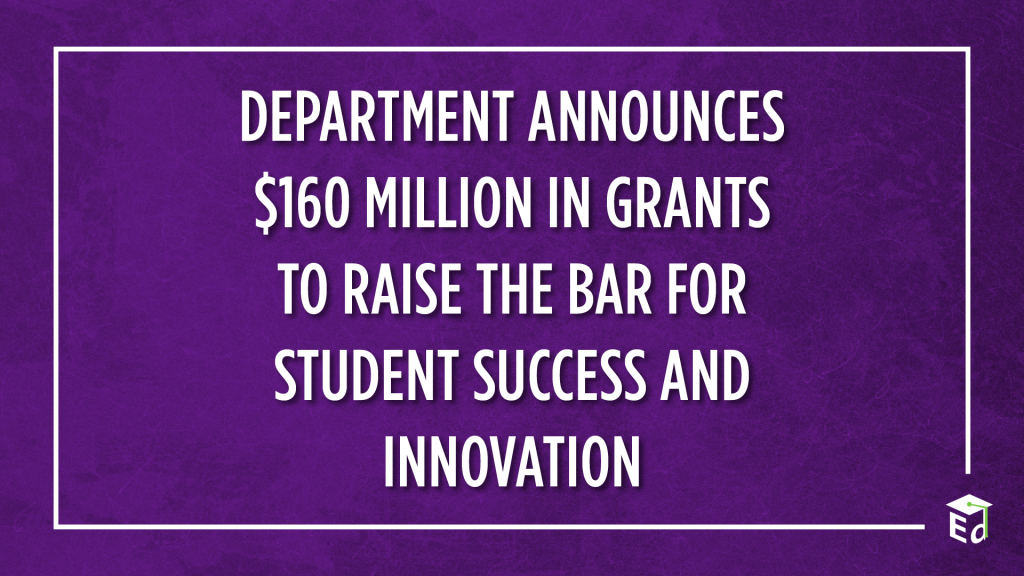Today, the U.S. Department of Education announced $160 million in new grant awards to 28 entities, including a state educational agency, local educational agencies, institutions of higher education, and nonprofit organizations across the United States through the Education Innovation and Research (EIR) program. These grants will boost local efforts to develop, implement and scale entrepreneurial and evidence-based projects that support improved academic achievement for underserved students.
The EIR program helps the field design, scale, and validate programs that can help solve education’s most pressing problems. Of the 30 grantees, 23 address at least one of the competition’s focused on addressing the impact of the pandemic or promoting equity in student access; 20 entities address both.
EIR grantees in the Fiscal Year 2022 cohort are exploring innovations for potential models for how the nation not only recovers from the pandemic, but emerges even stronger as schools are reimagined. These set of new grants also reflect bold and ambitious approaches to equity. The following projects are a sample of such ingenuity:
- MetaSocratic Peer Tutoring, San Diego Unified School District
- The Dual Enrollment Math Bridge, The College Bridge
- Relationships First: Scaling up a multi-tiered schoolwide restorative approach, School District of Philadelphia
- Project Transform: A Trauma-Engaged Approach to Improve Social, Emotional, and Academic Outcomes, Association of Alaska School Boards
- Expanding and Scaling the Pyramid Model in Pre-Kindergarten and Kindergarten Classrooms, Vanderbilt University
The grantees are committed to creative interventions. For example, the “Acorn Project” out of Northern Humboldt Union High School District will use a therapeutic learning classroom approach for drop-out prevention and formalized student supports, as well as college and career-readiness post-high school. By integrating across classrooms, this innovation includes an integrated wrap-around support system for at-risk students and their educators. The “Real World Data Science (RWDS)” project from PREP-Kansas City will create opportunities for middle school students to develop data science skills and prepare for a STEM-focused career by connecting STEM learning to experiential learning opportunities with industry professionals acting as advisors and subject-matter experts.
More than $78 million in EIR funding will support Social and Emotional Learning (SEL) projects. “Speak to the Potential, Ability, and Resilience Inside Every Kid (SPARK)” is a pre-teen intervention from the Research Triangle Institute which focuses on the individual strengths and the resilience of students to support a growth mindset emphasizing potential for development. This project seek to shine light on every student’s innate ability, potential, resilience, and mental well-being in relation to SEL, behavior, decision making, core skills, and academic competence. CAST, Inc. will develop and test another SEL-based project called “Circle Up” focused on student engagement in elementary schools. These models of universally designed learning environments with SEL supports are expected to impact student SEL outcomes, teacher understanding of and support for student wellbeing, and school culture/equity.
Funding will also provide more than $47 million to grantees focused on Science, Technology, Engineering, and Math (STEM) education. These projects are designed to address disparities in STEM learning opportunities due to a variety of barriers. The Wisconsin Center for Education Research, for example, will implement a web-based classroom assessment system to increase equitable access to learning constructs which often require heavy language loads. Through the inclusion of visuals, graphics, animations, and onscreen assists, students otherwise disadvantaged by traditionally language-heavy assessments will be better supported in learning of these complex concepts. The University of Oregon Foundation’s “Math Ready-Supporting Early Number Sense (M-SENS)” project aims to work with kindergarten teachers to integrate positive behavior management strategies in kindergarten. Building upon existing mathematics interventions, M-SENS will work in a whole-class format to address persistent challenges among classes where the majority of students are at risk for not meeting learning targets for mathematics as well as supporting teachers and schools that face escalating student needs in the general education setting.
A full list of selected grantees can be found here. : https://oese.ed.gov/offices/office-of-discretionary-grants-support-services/innovation-early-learning/education-innovation-and-research-eir/awards/







